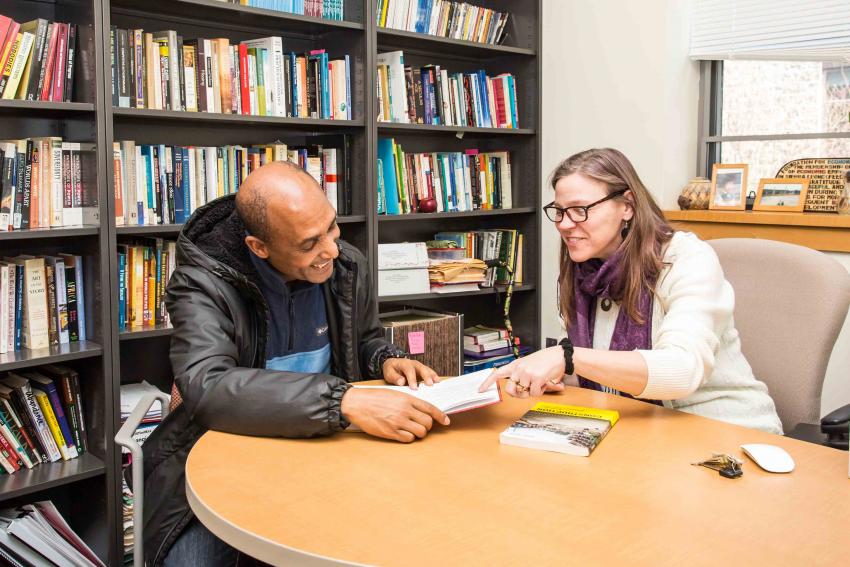Through Fellowship, Dr. Riggan to Research Refugee Choices

By Aaron Uscinowicz ’22
Through a Regional Faculty Fellowship with the Wolf Humanities Center at the University of Pennsylvania, Dr. Jennifer Riggan, professor of Historical and Political Studies at Arcadia University, will study how refugee choices are made across the contexts of time and space, as well as how an individual’s construction of time drives the decisions they make.
Between 2016 and 2018, Dr. Riggan completed ethnographic fieldwork on Ethiopian refugee policies and the influence they had on Eritrean refugees’ views on migration; the work culminated with a publication with news organization African Arguments with co-writer Dr. Amanda Poole, associate professor of Anthropology at Indiana University of Pennsylvania. During this time, the Ethiopian government was attempting to implement progressive policies designed to make refugees feel more welcomed, as well as encourage refugees to remain there rather than migrate onward to South Africa or to wealthier countries in Europe, North America, and the Middle East.
“What we found was that, despite Ethiopia’s generous attitude toward refugees, their policies really didn’t change the way refugees thought about migration,” said Dr. Riggan. “More specifically, refugees found that access to education was a sort of double-edged sword. They were thankful to be given the chance to go to school and university, but they were also suffering a lot because they had been given access to education but they couldn’t use it to improve their lives. They were not allowed to go to graduate school or to work in Ethiopia. Refugees wanted to be able to make progress, not to feel stuck.”
Dr. Riggan is turning this fieldwork into a book manuscript, The Hosting State and Its Restless Guests: Time-Making, Mobility and Containment Among Eritrean Refugees in Ethiopia, that focuses on the temporal phenomenon of “progress” and “being stuck” and its relation to how refugees think about time.
The Wolf Humanities Center Fellowship will provide Dr. Riggan an opportunity to develop a piece of her work that she says she hasn’t “thought enough about yet,” through her proposed project, “‘My dream is so many things!’” The Temporality of Choosing Between Migration and Containment Amount Eritrean Refugees in Ethiopia.”
“By engaging with other scholars who are all thinking about the concept of choice from different theoretical and disciplinary perspectives, I’m hoping to flesh out this final component of our work,” said Dr. Riggan. “During the course of the fellowship, I will be thinking through the question of how refugees make choices between different temporalities: the past, present, near future, and distant future, but also the relationship between them and how they align with thinking about whether to migrate or stay in Ethiopia.”
The Wolf Humanities Center at the University of Pennsylvania is an innovative research center at the University of Pennsylvania charged with demonstrating how vital the humanities are to the life of the mind and the health of society, and also how fundamentally connected they are with areas of inquiry in medicine, law, business, the arts, and the sciences.
Each year, the Regional Faculty Fellowship is awarded to Philadelphia faculty working on projects around a specific theme; the 2020-21 theme is “Choice.” Fellows attend the Wolf Center’s weekly Mellon Research Seminar and can present work, share ideas, and network with regional scholars.
“It’s exciting to be able to engage with professors and doctoral students from Penn as well as other regional faculty fellows in a weekly symposium,” said Dr. Riggan. “I will both present my work and comment on other fellows’ work.”
Dr. Riggan was a 2018 recipient of a Georg Arnhold Program on Education for Sustainable Peace Visiting Professorship and of a 2016 Teaching/Research J. William Fulbright Foreign Scholarship award. In 2018, her book, The Struggling State: Nationalism, Mass Militarization, and the Education of Eritrea, earned honorable mention from the Comparative and International Education Society’s Jackie Kirk Outstanding Book Award Committee.


